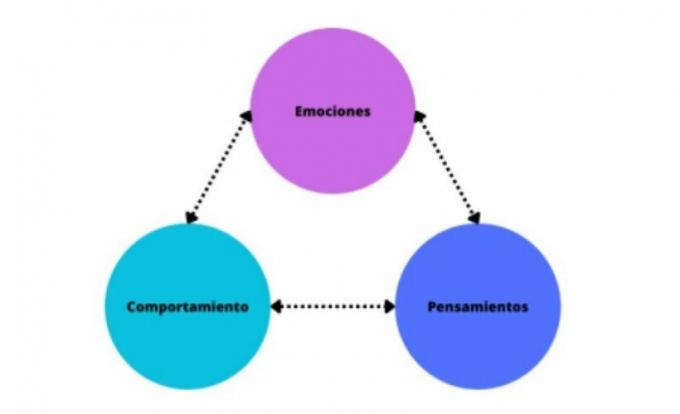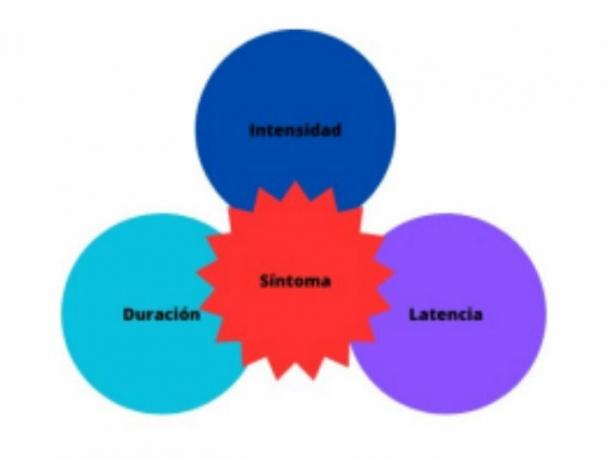When trying to eliminate suffering does not work
People often have to deal with uncomfortable emotions and feelings, sometimes very painful. All this is usually accompanied by intrusive thoughts, automatic and persistent that we want to get rid of.
Memories loaded with suffering or the constant need to move forward into the future, sometimes anticipating catastrophes, sometimes trying to control any event that could break our stability.
A vicious cycle of psychological discomfort
All these phenomena (thoughts and emotions) end up conditioning our way of behaving, and thus closes a circle in which thoughts-emotions-behavior feed back, being able to generate an authentic problem.
When you get into this labyrinth it is sometimes very difficult to get out and you need the help of a professional, this is what psychotherapy consists of.

The psychological therapy (or psychotherapy) can be understood as a collaborative process between the psychologist (an expert on his mind and processes) and the patient (an expert on himself and his own life). In this process, an evaluation of the case is carried out, which consists of analyzing all the variables that revolve around the patient and his suffering: his current vital context, his history personal, the way in which the problem has been constructed, the solutions that have been tried, the intensity and frequency of the symptoms as well as the contexts in which the problem occurs, etc
When there is a good understanding of the case, the treatment is carried out, this part of the process is oriented to modify patterns of behavior and habits (of the behavior properly manifest, but also of the mental processes, not so evident) that are in the basis of the problem, maintaining the disorder or any other form of maladjustment that is causing a discomfort.
By the way, psychotherapy is also oriented towards the prevention of illness, as well as the maintenance and promotion of health, making what already works continue to work or still work better.
- Related article: "Mental health: definition and characteristics according to psychology"
The relationship between psychotherapy and suffering
It is to be assumed that one goes in search of the help of a professional to overcome his problem. However, it is important to understand that the goal of psychotherapy should not be focused on the complete elimination of sufferingbecause this is impossible. Rather, psychotherapy helps the person to understand their suffering, give it meaning, understand how it is constructed and provide them with tools to be aware of the factors that trigger and maintain the symptoms and thus be able to use this information to reduce, minimize or mitigate the symptoms, thus allowing you to lead a life worthy.
The symptoms are all those "uncomfortable things" with which we have to deal and that are informing us that something is not right. Physical pain is a good example: we feel a throbbing pain in the foot when we have stepped on an object that has hit us. caused a wound, pain warns us that there is a wound that must be attended to, washed, disinfected and protected.
But also there are symptoms that tell us about mental suffering. Insomnia, constant anticipation, obsession with body image, decreased ability to enjoy or be excited about things that used to be nice, different forms of addiction, angry outbursts and frequent arguments are some examples of symptoms. We must understand all these phenomena as a signal that is indicating that there is an issue that must be addressed, they may be indicating that there is something that must be changed.
No one is exempt from developing some type of symptom, life carries pressures, we are subjected to stress and we all end up being affected by this, some do. they will suffer muscular contractures, others will feel an unproductive guilt, others will tend to isolate themselves socially, there will be those who develop hallucinations or delusions, etc
Depending on the physiology, personal history and structure of personality From each one, the way in which psychological suffering is expressed will take one form or another.
Suffering also plays a role
Returning to the previous point: suffering may be informing us of something. Seeing suffering from this perspective is often a 180º turn for people, because what What we usually do with all this is "start a fight against the symptom", without stopping to listen to what he has to say. tell us.
Perhaps that buzzing ringing in your ear (tinnitus) is telling you that you are too stressed and should reduce your self-demand.
Perhaps your frequent arguments with your partner are telling you that you can't take your job anymore and that you are paying for that frustration with the person who supports you the most.
It is also essential to be aware that some symptoms do not go away completely, which does not mean that we are condemned to always suffer, there are things we can do. In this sense, efforts should be directed not so much to eliminate the symptom but to control these three factors that revolve around the symptom:
- symptom intensity
- symptom duration
- symptom latency

An example of this might be the person who develops a addiction: "Maybe I have a smoking habit and I want to eliminate this behavior from my life because I consider it harmful. So ideally I will never smoke again - this is perfectly possible, it can be done. However, it is common in addictions that there are relapses.
Seeing the relapse as a total failure can lead to one getting hooked on the addiction "total, as already I've started smoking again... what does it matter? and then there is all that frustration that comes with relapse and that the drug helps to mask.
Therefore, it is worth asking: What has triggered this relapse? What happened just before the relapse? What is happening now in my life? What changes have there been lately?
And don't lose sight:
- Symptom intensity: now that I've started smoking again, have I smoked the same amount that I smoked at my worst?
- Symptom duration: Now that I've started smoking again, how many days have I been smoking? Has it decreased compared to other times in my life when I used? - Symptom latency: refers to the period in which there have been no symptoms, if, for example, you have not smoked for three years.
Trying to reduce the intensity and duration of the symptom and increasing its latency is often more realistic than trying to eliminate the symptom completely.. In this way, one learns to live with anxiety, with the need for control or with the tendency to procrastinate, knowing that this is not "an evil that I should be cured" but a state of mind in which I can enter and I can leave, learning to handle the conditions that cause the symptom to occur in question.
If, for example, I become aware that the intrusive thoughts of my obsessive-compulsive disorder (OCD) and irrational feelings of guilt and shame become especially intense when I accumulate several nights of little rest, I can focus on having adequate sleep hygiene guidelines to minimize the impact of my crises obsessive In this sense, the prophylaxis (measures to reduce the symptom) of my OCD will go in the line of sleeping at appropriate hours and be especially attentive to when I have a sleepless night, because if I accumulate several sleepless nights it is likely that the symptoms that characterize my particular way of living will trigger. suffer.
Thus, psychotherapy becomes a process focused on self knowledge: know myself and know my disease (which, it is not bad to remember: we are not the same thing). And it is one thing to know the disease and another thing to know how that disease expresses itself in me, not all people who suffer from depression do so for the same reasons, they do not experience it the same way or come out of depression in the same way manner.
It then consists of knowing myself in all my contexts: with the disorder and without the symptoms. All this information provides the person with useful strategies and helps them to better deal with life in general and with their suffering in particular.
Conclusion
Psychotherapy should be aimed at emancipating the patient from the psychotherapist and, when possible, from medication.
The primary objective should be that each one becomes their own psychologist: therapeutic discharge is that moment when the process is consolidated and the patient can manage alone and the psychologist is no longer necessary.
While it is helpful and reassuring for some people to know that there is a possibility of returning to the therapy space to reinforce what was learned or remember some issues or to learn to manage new problems that can seem.

